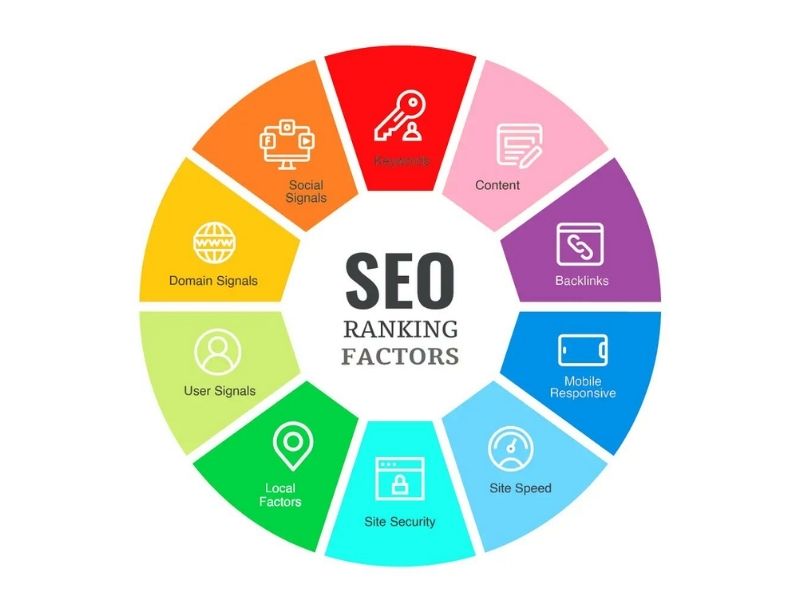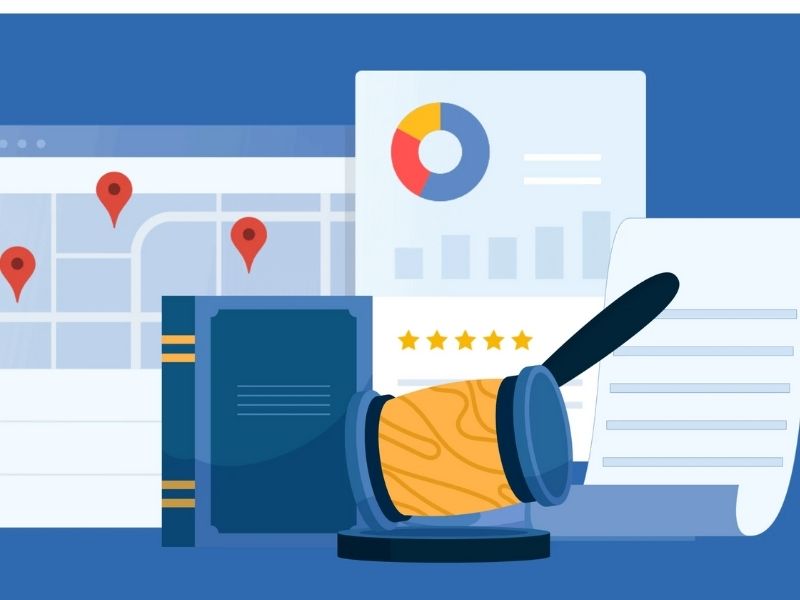If you’re a lawyer aiming to grow your practice, you’ve likely come across the term “SEO for lawyers“. But what does it actually mean, and why should it matter to you? SEO, or Search Engine Optimization, focuses on improving your website’s visibility so that potential clients actively searching for legal services can find you online.
In a fiercely competitive legal market, standing out on Google isn’t just an advantage, it’s essential. At OctopusWriters, we specialize in crafting tailored SEO strategies for lawyers, helping you navigate the digital landscape and attract the clients you need. Let’s break it all down.
What is SEO for Lawyers?
SEO for lawyers is the practice of optimizing a law firm’s online presence to improve its visibility on search engines like Google. In simpler terms, it’s about making sure that when someone searches for legal services, your firm appears at the top of the results. Think of it as digital marketing tailored specifically for the legal industry.
Why does this matter? Because today’s clients aren’t flipping through phone books or relying solely on referrals—they’re turning to the internet. If your law firm doesn’t show up in their search, chances are, they’ll choose a competitor who does.

SEO for lawyers focuses on specific strategies like targeting legal-related keywords (e.g., “family lawyer near me”), creating valuable content that answers potential clients’ questions, and optimizing for local searches to attract people in your area. It also involves technical aspects, like ensuring your website loads quickly and works seamlessly on mobile devices.
Ultimately, SEO isn’t just about getting traffic; it’s about getting the right traffic. With the right strategy, you’re not just increasing visitors—you’re connecting with people who are actively searching for the services you offer, leading to more inquiries, consultations, and clients.
Does SEO for Solicitors Actually Work?
The short answer: yes, SEO for lawyers works—when executed effectively.
One of the biggest hurdles for law firms diving into SEO is figuring out how to secure a top spot in organic search results. Let’s face it, the competition is stiff, and every law firm is vying for the same coveted positions.
While many providers offer SEO services for lawyers, it’s important to remember that no one can guarantee the #1 ranking on Google. However, that doesn’t mean success is out of reach. By focusing on proven strategies, you can significantly improve your chances of landing on the first page.
To make it simple, we’ve broken down the key factors that can help elevate your law firm’s visibility and boost your SEO for lawyers strategy.
Why Is SEO Crucial for Lawyers?
The days of relying on the Yellow Pages or directory assistance are long gone. Today, when someone needs legal help, their first instinct is to turn to the internet. This is where SEO for lawyers becomes a game-changer.
According to the National Law Review, a staggering 96% of people seeking legal advice start their search online. Unsurprisingly, Google is their go-to search engine. With 3.5 billion Google searches conducted daily and the platform dominating 93% of all search engine traffic, a strong SEO for lawyers strategy can make or break your firm’s visibility.

Where your firm ranks on Google’s search engine results pages (SERPs) is directly tied to your caseload and revenue. The higher your law firm appears, the more visitors—and potential clients—you’re likely to attract. Why? Because most users don’t look past the first page. In fact, fewer than 3% venture to the second page, and less than 1% click on anything they find there.
But it’s not just about landing on the first page; it’s about securing a top spot. Research shows that the first organic result on Google is up to 35 times more likely to get a click than the 10th result. A firm ranking first on desktop sees an average click-through rate (CTR) of 31.17%, while mobile searches boast a CTR of 25.68%. After the first position, CTRs drop sharply, highlighting the importance of ranking at the very top.
Half of all users end up choosing one of the first three organic search results, making it clear why investing in SEO for lawyers is essential. The competition is fierce, and the firms dominating the rankings are likely the ones leveraging effective SEO strategies tailored for law firms. If you want to grow your practice, you need to care about where your website ranks—and take action to ensure it stays competitive.
The Key Google Ranking Factors for SEO for Lawyers
SEO for lawyers goes beyond simply being visible online—it’s about positioning your law firm strategically to connect with potential clients at the moment they need your services most. As Google’s algorithm continuously evolves, understanding and leveraging the key ranking factors can significantly boost your law firm’s website visibility, helping you attract and retain more clients.
While Google has made dramatic changes to how it prioritizes content over the years, the foundation of SEO success remains unchanged. These core pillars are the bedrock of every successful SEO for lawyers strategy, and they’re essential for staying competitive in the digital age.

E-E-A-T: Showcasing Your Authority
Google emphasizes Experience, Expertise, Authority, and Trustworthiness (E-E-A-T) as critical factors in determining search rankings, particularly in industries like law. Potential clients need assurance that your firm has the knowledge and skills to handle their case.
How do you convey this? By creating high-quality content that highlights your legal expertise. Blog posts, articles, and FAQ sections should reflect professional insights, ideally written or reviewed by attorneys at your firm. Including lawyer credentials, success stories, and real-world case studies in your content builds trust and shows clients why you’re the right choice.
Target Audience and Search Intent
Understanding your audience is the backbone of any successful SEO for lawyers strategy. Ask yourself:
- Are potential clients searching for detailed legal guides?
- Do they need answers to common legal questions?
Aligning your content with user intent ensures that your website provides solutions to what people are actively searching for. By addressing their specific needs, you boost your chances of appearing in relevant search results—and converting visitors into clients.
Smart SEO Keyword for Lawyers Optimization
Effective SEO for lawyers relies heavily on strategic keyword integration. While keyword stuffing is a thing of the past (and can even lead to penalties), proper keyword optimization remains essential.
Focus on long-tail keywords that align with how clients search for your services, such as “personal injury attorney in Los Angeles” or “how to file a wrongful termination lawsuit.” Naturally incorporate these phrases into titles, headings, and content to enhance your website’s rankings without making it feel forced or robotic.
Frequent Content Updates to Stay Relevant
The legal world is ever-changing, with new regulations, case law, and legal trends constantly emerging. Regularly updating your website with fresh, relevant content helps demonstrate that your site is an authoritative and current resource for legal information.
Updating your blog with articles about recent cases, changes in laws, or insights into legal processes not only engages your audience but also signals to Google that your site is active and relevant. This consistent flow of fresh content allows you to naturally incorporate SEO for lawyers keywords while keeping your audience informed.
Creating Engaging and Shareable Content
In today’s social media-driven landscape, creating content that’s not only informative but also engaging and shareable can dramatically amplify your reach. Think beyond traditional blog posts—incorporate interactive elements like case studies, infographics, or short, educational videos.
These formats are perfect for social sharing and can increase backlinks to your site, further boosting your rankings. By crafting content that informs and entertains, you keep visitors on your site longer while simultaneously expanding your online visibility through social media and external links.
By mastering these Google ranking factors, your SEO for lawyers strategy will help your firm stand out, attract high-value clients, and establish your website as a trusted resource in the legal field.
11 Proven SEO Tactics to Expand Your Law Firm’s Reach
SEO for lawyers is a diverse and ever-evolving field, offering countless strategies to enhance your firm’s online presence. While there are many approaches you can take, law firms often benefit most from focusing on local SEO tactics, given the community-centered nature of their services. These localized strategies ensure your firm is visible to potential clients in your geographic area.
Here are two essential SEO tactics to kickstart your journey toward optimizing your law firm’s website and boosting your visibility:
Conduct Thorough Keyword Research
Keywords are essential for attracting the right audience to your site. Potential clients use search engines like Google to find legal services, so identifying terms they’re likely to search is critical. Choosing specific keywords, like “divorce lawyer consultation,” is far more effective than ranking for irrelevant phrases such as “family law drama series.”
Start with broad topics tied to your practice areas, like divorce or child custody, and use tools like Google’s Related searches or People also ask features to uncover more specific ideas. For instance, searching “family law child custody” may reveal long-tail keywords like “child custody lawyers” or “custody agreement tips.”
Focus on keywords that balance search volume, business relevance, and ranking difficulty. For example, a term like “supervised visitation,” with over 10,000 monthly searches and moderate competition, could bring in highly targeted traffic.
Create Comprehensive Content Hubs

Once you’ve identified your core topics and associated keywords, the next step is to organize your content into structured hubs, also known as topic clusters. Content hubs are an excellent way to establish your expertise in a specific area, offering in-depth resources that Google and your audience will value. Each hub includes a central “pillar” page that covers the overarching topic comprehensively and links to more detailed “cluster” pages addressing specific subtopics.
For example, if your central topic is child custody, your pillar page could provide a broad overview of custody laws, types of custody, and legal processes. Supporting cluster pages could then dive into individual subtopics like custody agreements, visitation schedules, or how to modify custody orders. This approach helps search engines understand the relationships between your content while demonstrating your authority on the subject.
Create High-Value Content
After mapping out your content hubs, the next step in an effective SEO for lawyers strategy is to produce high-value content. For your content to resonate with readers and perform well in search rankings, it should:
- Match the searcher’s intent by fully addressing their query.
- Provide thorough, meaningful, and accurate information.
- Be free from grammatical, spelling, or factual errors.
- Be optimized for search engines without compromising readability.
Creating such content can feel like a tall order, but tools like AI writing assistants can streamline the process. That said, legal content often falls under Google’s “Your Money or Your Life” (YMYL) category, meaning it must be especially accurate and reliable. While AI can assist, it’s vital to add a human touch to ensure the content reflects your unique legal expertise and includes insights tailored to your audience’s needs..
Identify Relevant Keywords to Enrich Your Content
To strengthen your SEO for lawyers strategy, it’s crucial to include relevant keywords in your content. These keywords help search engines understand the topic and intent of your page, a process known as Natural Language Processing (NLP) optimization.
For example, if you’re writing about “how to get a divorce,” related keywords might include:
- “How long does a divorce take?”
- “How much does a divorce cost?”
- Related terms like “husband,” “wife,” and “divorce lawyer.”
These keywords should flow naturally throughout your article—avoid forcing them into the text, as it can harm readability and SEO performance.
To find relevant keywords, utilize tools like Google’s autosuggest, related searches, and the “People also ask” feature. Simply search your main keyword, note related terms, and strategically incorporate them into your content.
Perform On-Page SEO

On-page SEO ensures your content is optimized for search engines, helping them better understand your article’s topic. Incorporate your keywords naturally and strategically in key areas, such as:
- URLs: Include your primary keyword and avoid using dates or numbers to keep URLs evergreen.
- Page Titles: These can differ from your H1 and allow for keyword variations.
- Header Tags: Use H1, H2, H3, etc., to organize your content and signal its structure to search engines.
- Body Content: Sprinkle keywords naturally throughout your text, avoiding overuse.
Build Local SEO for lawyers
Local citations play a critical role in establishing your online presence and supporting your SEO for lawyers strategy. Citations reference your law firm’s details, such as its name, address, and phone number (NAP), across various online platforms.
Here’s how to effectively build and manage local citations:
- Submit Your NAP Information: Add consistent business details to directories like Yelp, Bing Places, Facebook, and Apple Maps.
- Ensure Accuracy: Any inconsistencies in your NAP details across platforms can confuse search engines and harm your rankings. Take the time to enter accurate information.
- Use Custom Google Searches: To find niche directories, try searches like intitle:directory keyword or inurl:resources keyword.
Accurate local citations not only improve your search engine visibility but also help potential clients find your firm quickly and reliably.
Optimize Your Google Business Profile
A well-optimized Google Business Profile (GBP) is a cornerstone of local SEO for lawyers and can make a huge difference in your visibility. When properly set up, your profile ensures your law firm appears in local searches and for specific legal service queries, such as “divorce lawyer near me” or “personal injury attorney in Dallas.” This free tool helps prospective clients see your contact details, a business description, and even reviews at a glance.
Demonstrate E-E-A-T
Google prioritizes content that demonstrates Experience, Expertise, Authoritativeness, and Trustworthiness (E-E-A-T)—especially for legal topics, which fall under the “Your Money or Your Life” (YMYL) category. For law firms, establishing E-E-A-T is critical to building credibility with both Google and potential clients.
Here’s how to showcase E-E-A-T:
- Show Credentials: Add an “About Us” page that highlights your firm’s history, areas of expertise, and attorney qualifications. Include a “Meet the Team” section with detailed bios and credentials for each lawyer.
- Add Testimonials: Showcase client reviews and success stories on your site and within your Google Business Profile. These serve as powerful social proof of your reliability and expertise.
- Write Case Studies: Publish case studies that highlight your firm’s successes. These can outline how you resolved complex cases, reinforcing your authority in the field.
Manage Your Online Reputation
In today’s digital world, reputation management is key to maintaining credibility. Potential clients often compare law firms by reading reviews and testimonials to determine which firm is the best fit. Your SEO for lawyers strategy must include proactive online reputation management to position your firm as a trusted choice.
- Encourage Reviews
- Address Negative Feedback
- Showcase Positive Feedback.
Earn Backlinks for Lawyers to Boost Authority
Backlinks from reputable websites are a powerful signal of credibility for Google. A strong SEO for lawyers strategy focuses on earning high-quality backlinks.
- Guest Posting: Publish articles on other websites and include links to your site.
- Create Original Content: Develop unique resources like infographics or tools that attract natural backlinks.
- Use HARO and Qwoted: Contribute expert insights to journalists in exchange for links to your site.
Measure Your Performance
Tracking your SEO efforts is crucial to ensure your strategy is effective. Regularly measure key metrics like website traffic, keyword rankings, and client inquiries to assess your performance. Use tools like Google Analytics and Google Search Console to monitor progress and identify areas for improvement.
Pay attention to high-performing content, as well as pages that need optimization. Adjust your strategy based on data insights to continuously improve your SEO for lawyers and stay competitive in search rankings.
Local SEO for Law Firms

Local SEO is essential for law firms, as most legal clients look for nearby attorneys who can address their specific needs. By focusing on local SEO strategies, you can ensure that your firm appears prominently in search results when potential clients search for services in your area. This is a critical part of any SEO for lawyers strategy, helping you connect with the right audience at the right time.
SEO for Immigration Lawyers
Immigration law often requires personalized services, which makes local SEO particularly valuable. People searching for immigration lawyers typically use localized keywords, such as “immigration lawyer near me” or “immigration lawyer in [city/state].” To optimize for these searches:
- Google Business Profile: Ensure your profile includes accurate details about your services, hours, and location.
- Localized Keywords: Target phrases like “visa lawyer in [city]” or “citizenship attorney near [state].”
- Content Tailored to Local Needs: Write blog posts addressing immigration laws and processes specific to your area.
By focusing on local SEO, immigration lawyers can position themselves as trusted experts in their community and enhance their SEO for lawyers strategy.
SEO for Criminal Defense Lawyers
For criminal defense lawyers, appearing in local searches is crucial, as clients often search for immediate assistance in urgent situations. To dominate local SEO in this area:
- Location-Specific Pages: Create pages that highlight your services in different cities or regions you serve.
- Reputation Management: Encourage positive client reviews on Google and other platforms to build trust.
- Local Keywords: Use terms like “DUI lawyer near me” or “criminal attorney in [city/state].”
Additionally, ensuring your website is mobile-friendly is vital, as many potential clients search for criminal defense services on their phones. By leveraging these tactics, criminal defense attorneys can strengthen their SEO for lawyers efforts and attract more local clients.
Affordable SEO for Lawyers
Implementing SEO for lawyers doesn’t have to break the bank. With strategic planning and the right tools, even small firms can improve their online visibility without overspending.
Start by focusing on cost-effective tactics like optimizing your Google Business Profile, using free keyword research tools, and creating valuable content that addresses common client questions. Local SEO strategies, such as building citations and encouraging client reviews, are also affordable and highly effective.
By prioritizing these budget-friendly techniques, you can enhance your SEO for lawyers strategy and attract more clients while keeping costs under control.
Top 4 Best SEO for Lawyers Examples
Morgan & Morgan
Morgan & Morgan, a prominent personal injury law firm, has achieved remarkable online visibility through a comprehensive SEO approach. Their strategy includes:
- Content Marketing: Regularly publishing informative blog posts and articles addressing common legal questions and concerns.
- Local SEO: Optimizing their website for local searches by creating location-specific pages and ensuring consistent business listings across directories.
- Technical SEO: Maintaining a user-friendly website with fast load times and mobile optimization.
This multifaceted approach has positioned Morgan & Morgan as a leader in SEO for lawyers, attracting a steady stream of potential clients.
Smith & Jones Law Firm
Smith & Jones, a boutique criminal defense firm, has leveraged SEO to compete with larger firms by:
- Keyword Optimization: Targeting niche keywords related to specific criminal charges and legal defenses.
- Client Testimonials: Featuring positive client reviews prominently on their website to build trust and credibility.
- Local Citations: Ensuring their firm is listed accurately on local business directories and legal platforms.
By focusing on these areas, Smith & Jones have enhanced their SEO for lawyers strategy, resulting in increased local search visibility and client inquiries.
Immigration Advocates LLP
Specializing in immigration law, Immigration Advocates LLP has implemented effective SEO tactics, including:
- Multilingual Content: Providing website content in multiple languages to cater to a diverse client base.
- Educational Resources: Offering downloadable guides and FAQs on immigration processes to engage and inform visitors.
- Backlink Building: Collaborating with reputable organizations and earning backlinks from authoritative sites.
These efforts have strengthened their SEO for lawyers framework, making them a go-to resource for immigration legal services.
Green & Associates Family Law
Green & Associates, focusing on family law, have enhanced their online presence through:
- Local SEO: Creating detailed profiles on local directories and encouraging satisfied clients to leave reviews.
- Content Strategy: Publishing articles on topics like divorce, child custody, and alimony to address common client concerns.
- Social Media Integration: Sharing blog posts and legal updates on social media platforms to drive traffic to their website.
Is Hiring an SEO Agency for Lawyers the Right Move?

When it comes to improving your online visibility, you may wonder if hiring an SEO agency is the best choice for your law practice. While managing SEO for lawyers in-house is possible, it often requires time, expertise, and resources that many law firms might not have. Partnering with a professional agency can help you achieve faster, more reliable results.
Agencies like OctopusWriters specialize in crafting tailored strategies for law firms, ensuring your website ranks high in search results and attracts the right clients. They handle tasks such as keyword research, content creation, and local SEO optimization, freeing you to focus on what matters most—your clients.
Hiring an agency also brings access to industry-specific expertise and advanced tools that can track progress and refine strategies over time. If you’re serious about growing your practice, working with a trusted partner like OctopusWriters can be a game-changer for your SEO for lawyers efforts.
How Long Does It Take to See SEO Results for Law Firms?
When implementing SEO for lawyers, you can typically expect to see measurable results within 6 to 12 months. However, if your efforts show no progress after a year, it may be time to adjust your strategy or consider bringing in professional help. Patience is key, as SEO does not produce instant outcomes. Instead of looking for overnight success, focus on consistently applying proven tactics, and you’ll eventually benefit from increased visibility and client inquiries.
What Are the Costs of Legal SEO?
The cost of SEO for lawyers varies widely depending on whether you choose to work with an agency or handle the process yourself. Hiring an agency can cost anywhere from $1,000 to $20,000 per month, depending on your market, competition, and growth goals.
If you decide to manage SEO independently, the financial investment will be lower, but you’ll need to dedicate significant time and effort. Additionally, purchasing essential SEO tools is necessary to optimize your strategy and maximize results. Whether you invest in an agency or go the DIY route, a well-planned SEO for lawyers strategy is critical to your law firm’s long-term success.
Top 7 Essential SEO Tools for Law Firms
For law firms aiming to improve their online presence, leveraging the right SEO tools can make all the difference. These tools help optimize your website, track performance, and refine your SEO for lawyers strategy to attract more clients effectively. Here are seven must-have tools for law firms:
- Google Analytics: This free tool provides valuable insights into your website traffic, user behavior, and performance metrics. It helps you identify which pages are attracting visitors and where improvements are needed.
- Google Search Console: Essential for monitoring your website’s search performance, this tool shows how your site appears in search results, tracks keyword rankings, and highlights technical issues that may hinder SEO.
- Ahrefs: Known for its powerful backlink analysis, Ahrefs is great for identifying link-building opportunities and analyzing competitors. It also offers keyword research and site auditing features.
- SEMRush: A versatile tool for keyword research, competitor analysis, and tracking rankings. SEMRush also includes features to optimize local SEO, which is crucial for law firms targeting specific regions.
- Moz Pro: Moz is perfect for improving on-page and technical SEO. Its tools for keyword research, site crawling, and domain authority tracking make it a valuable asset for law firms.
- Yoast SEO: If you’re using WordPress, Yoast SEO is a must-have plugin. It simplifies optimizing your content, meta descriptions, and readability, ensuring your site meets SEO best practices.
- BrightLocal: A specialized tool for local SEO, BrightLocal focuses on managing business listings, tracking local rankings, and collecting reviews, making it ideal for law firms looking to dominate their local market.
These tools are invaluable for any SEO for lawyers strategy, helping law firms identify opportunities, overcome challenges, and achieve long-term success in search rankings.
Conclusion
Excelling in SEO for lawyers is crucial for any law firm aiming to maintain a strong competitive edge online. From local SEO to high-value content and backlinks, each tactic works together to boost visibility and attract clients. While success takes time and consistent effort, the rewards are worth it.
For those who need expert guidance, OctopusWriters offers tailored SEO solutions designed specifically for law firms. Let them help you craft a winning strategy to grow your practice and achieve your goals.
SEO for Lawyers- Frequently Asked Questions
When do law firms see SEO results?
SEO is a long-term strategy, and law firms can usually start seeing results within 6-12 months. Factors like competition, keyword difficulty, and the quality of your SEO efforts play a role in how quickly you’ll notice improvements.
Is local SEO necessary for law firms?
Yes, local SEO is crucial for law firms because most clients search for legal services near their location.
Can small law firms afford SEO services?
Yes, small law firms can implement affordable SEO for lawyers by focusing on budget-friendly strategies like optimizing their Google Business Profile, creating localized content, and using free SEO tools. Partnering with agencies like OctopusWriters can also provide cost-effective solutions.
Should I partner with an SEO agency for Lawyers?
While it’s possible to manage SEO on your own, working with a professional agency can save time and deliver better results. Agencies like OctopusWriters specialize in legal SEO, offering tailored strategies that help law firms rank higher and attract more clients.

